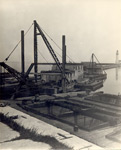Chicago Times (Chicago, IL), 20 July 1871
- Full Text
- BURNING OF THE PROPELLER
JOE BARBER .A serious disaster occurred on the lake about midnight on Tuesday, the propeller Joe Barber being burned between this
city andSt. Joseph , Mich., and two lives lost.The vessel left
Benton Harbor shortly after 2 o'clock on the night above mentioned, for this port, having on board a cargo of 130 cases of berries and a crew of 18 men, including the captain,James F. Snow , and the mate,George Germain , besides two passengers, whose names have not been learned.Capt. Snow turned in to read shortly after 9 o'clock, leaving the boat in charge of the mate. He had not been in the cabin half an hour when he was alarmed by the cry of fire, and on rushing out found that the entire stern of the steamer was completely wrapped in flames. The fire spread very rapidly, and rendered the most strenuous efforts to check its progress entirely futile. It was found impossible to launch the boats, and orders were immediately given to those on board to save themselves. Doors, shutters, and every available thing that would float was thrown overboard, andthe passengers and crew clung to them as the only means of saving their lives.
Very fortunately the steamers
Van Raalte ,Corona , andSkylark , of theGoodrich line, were near the burning vessel, and in a short time all the persons but two, on the ill-fated steamer were picked up and cared for. It is feared that the watchman and a negro deck hand were drowned.Twelve of the persons on the Barber were picked up by the Van Raalte, and six by the Corona.
The origin of the fire is not positively known, but is supposed to have originated in the boiler rooom, through the over-heating of the smokestack and machinery.
Capt. Snow states that he was suddenly aroused from his cabin at 7 o'clock, [sic] and, on rushing to the deck, found the vessel in flames, and but little time left to prepare for an escape from the fire. He immediately gave orders for the crew and passengers to [one word illegible] doors and shutters and jump overboard. In about 20 minutes afterward the Van Raalte and Corona appeared on the scene, and saved 18 persons. But for this timely aid, the captain says that the majority of those in the water would have perished. Capt. Snow expresses the opinion that the engineers were neglectful of their duty, otherwise the fire would not have occurred. He describes the excitement on board as intense. The visitation came upon the crew and passengers so suddenly that they had barely time to escape burning. The room in which the life-preservers were kept was enveloped in flames before it could be reached, and those on board were compelled to jump overboard and trust to obtaining hold of some of the furniture which had been hastily torn from the cabin and thrown overboard.
The survivors are very thankful to the captains and crews of the Van Raalte and Corona, for it was only by their efforts that their lives were saved.
The Barber was built in 1856, at a cost of $21,000. For two years, she was employed in the lumber trade, and, in 1866, was rebuilt for the fruit trade between here and St. Joseph. She ranked B1. Her length was 140 feet, with 24 feet beam. Her machinery was powerful and expensive. She carried 306 tons.
The loss to the owner will reach $14,000, about half the amount being covered by insurance. Capt.
Selah Dustin , ofDetroit , owned the boat, and chartered her to Capts.Paxton andBoughton , of St. Joseph, for this season.The statement of the passengers on board the Van Raalte and Corona verify that given above. They describe the scene as an appalling and exciting one. The Van Raalte was close to the Barber when the latter caught fire, and immediately hove to, to render assistance. The Corona was two miles distant from the burned propeller when the flames were first observed. Steam was quickly increased, and the Corona was soon alongside the wreck, rendering all the assistance in her power.
Both vessels above named arrived here yesterday, bringing with them the persons saved. The Skylark was on hand to give assistance, but her services were not required. She remained at the wreck after the other steamers had left, but could discover nothing of the two missing men.
The hulk of the propeller sank in about 80 feet of water an hour after the fire first broke out. It was burned close to the water's edge.
Several years ago the boiler of the Barber exploded in this city, and shortly afterward a steam flue burst, fatally scalding one man. She was for several years connected with the
Englemann east-shore line, plying fromMilwaukee andMuskegon . She has been regarded as unseaworthy by marine men for some years past, although she had been renewed in many parts. - Media Type
- Text
- Newspaper
- Item Type
- Clippings
- Date of Original
- 20 July 1871
- Local identifier
- GLN.3232
- Language of Item
- English
- Donor
- Robert Myers
- Copyright Statement
- Public domain: Copyright has expired according to the applicable Canadian or American laws. No restrictions on use.
- Contact
- Maritime History of the Great LakesEmail:walter@maritimehistoryofthegreatlakes.ca
Website:


